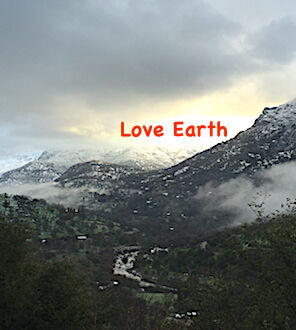Relationships
Loving Earth
Humans are capable of deep loving connections, including love of Earth.
Posted June 14, 2020

Of living beings, who do you most love? Yourself, your child, your friend, your spouse, your parents, someone who helped you during your life, your dog? All of these? If you can identify someone you love, it implies you can identify the inner experience of being loving.1 It may be a feeling of warmth within your heart, a softening of your voice and stance, a willingness to look directly into another’s eyes or to offer the gentle touch of your hand.
With someone you love deeply, how would you behave toward them? Would you be kind, compassionate, generous? Would you listen to them with attentive openheartedness? Would you help them through a difficult time? Would you comfort them through their deepest fears?
When you are making decisions about your own needs, would you take into account the needs of the one you love? Would you be willing to sacrifice something you want in order for them to have what they need even if inconvenient for you?
For most, if not all, of the questions of love above, it is reasonable to assume the answers would be “yes.”
For someone you love deeply, would you deny them clean water, take them to a place where it was difficult to breathe, cage them in a confined space, or steal treasures they owned? Would you treat them as servants to do your bidding?
For these questions, one would hope all the answers would be “certainly not!”
One can say the words “I love you” to let someone know your feelings, but the more significant declaration of love is expressed through active behaviors that demonstrate a deep and valued connection.
When we used the words “I love” for objects or activities, such as clothes, sports, pizza, movies, etc., what we really mean is we “like” or “enjoy” them for the pleasure they give us. The misuse and overuse of the word “love” are built into our everyday language. Such use has the potential of diminishing or distorting the deeper meaning of “love” as related to compassion and caring. It is the latter use of the word that is addressed here. However, it is applied to what most might consider an “object,” namely Earth.
Can you love Earth as a living being? Can you love Earth as you love another human, with your whole heart, with your deepest sense of intimate connection, with a level of caring such that you are willing to make sacrifices for its benefit?
If you were to remove the biosphere of all but humans, what would that barrenness be like? There would be no atmosphere, no oceans, nothing else on the land but humans and rocks. No human would last a fraction of a second in that situation.
We need the presence of water all through our bodies. We need the presence of plants to generate oxygen for us to breathe and to sustain the production of our biochemical energy. We need plants and animals as food to supply us the atoms and molecules to replace those we lose as we live. We are dependent on Earth to live on Earth. Period.
Earth can be viewed as its own form of one “living being” (sometimes called Gaia2). It is a complex system with a continuous dynamic set of processes. Its components are living and dying, forming order then disorder, connecting then disconnecting—all interconnected as part of the ongoing intrinsic process of evolution of new forms. Earth “houses” life and we humans are among its current progeny.
Is that not reason enough to love Earth?
Though Earth presents us with natural disasters like floods, hurricanes, earthquakes, or volcanoes, life as a whole, if not individually, has survived monumental disasters and continues to adapt. We don’t have to love these disasters to love Earth. Each life, human and otherwise, has one unique opportunity to be a participant within this “house of life.”3 We humans are a community of life within a larger community of life that cannot be ignored.
Can you love your “house of life”?
If you can love another human being, then you are capable of knowing love. If you know love, you also know it need not be limited to one person only. It can simultaneously be extended to other humans, other animals, to plants, and all forms of life interweaving within our own presence every moment. You may not like some life forms that want to destroy you, but you can still love life as life, as beingness, as a miracle of complexity that has come forth from the universe. You can behave as a loving member of this house.
If we love Earth, how can we possibly want to use it as a disposable resource? To do so is to be willing to dispose of humans as well. If we love Earth, how can we cut down its trees that provide the oxygen for the lives of animals? How can we convert its materials into forms that are out of sync with natural decomposition and renewal cycles?
If we love Earth, really feel it as intimately as a dearest beloved, we cannot justify in any way behaviors that proclaim humans as owners of Earth. Earth is a shared place, life a shared experience, all of it together is here to be loved—first loved, understood, treated with kindness, generosity, patience, respect, then loved even more for providing us the experience as humans participating with it in all its magnificence.
The first step, the baby step that is the step of a new manifestation of humans, must begin with loving Earth as our Mother willingly holding out her hand to encourage and guide us in mutual cooperation. We must learn how to do this together as our primary guiding principle moving forward as one humanity, one humanity that loves, truly loves, one Earth.
© Betty Luceigh, June 2020
References
1 For this exploration it is important to distinguish love (deep affection) from lust (sexual desire). Though both may coexist, that is not the focus of this discussion
2 Gaia is a mythological name revived by James Lovelock (1979); it means “Earth considered as a single natural system that organizes and controls itself " (Oxford Dictionary).
3 “House of life” is the meaning of the term ecozoic to describe a coming new age characterized by a new relationship of humans with Earth. (For more information: www.ecozoicstudies.org )




